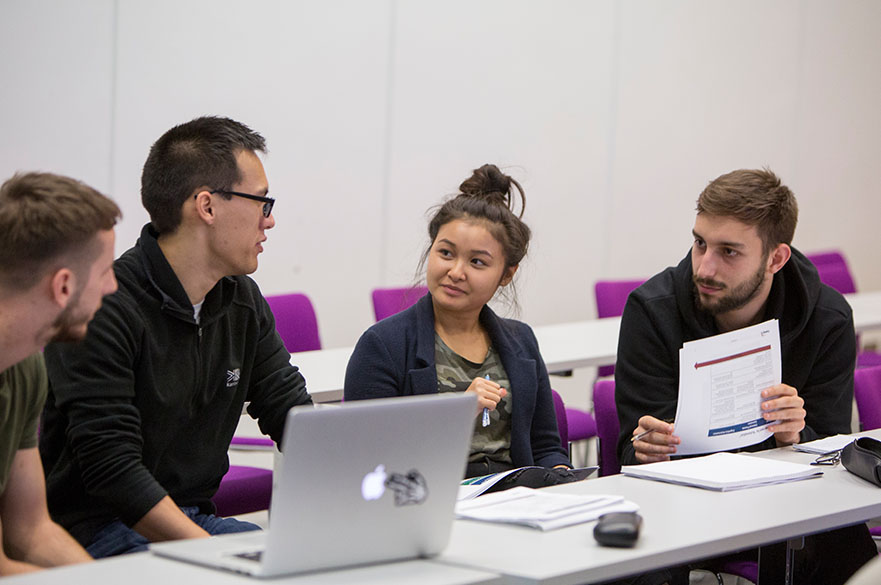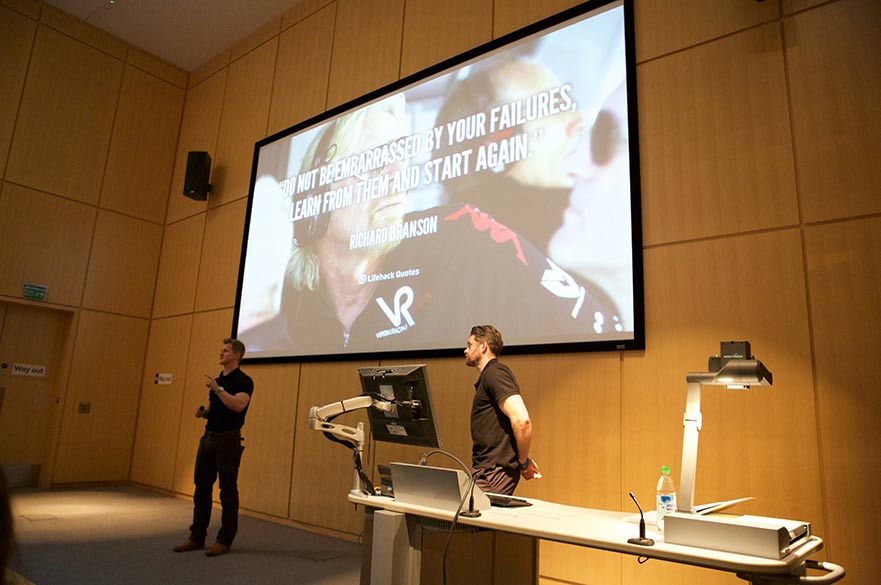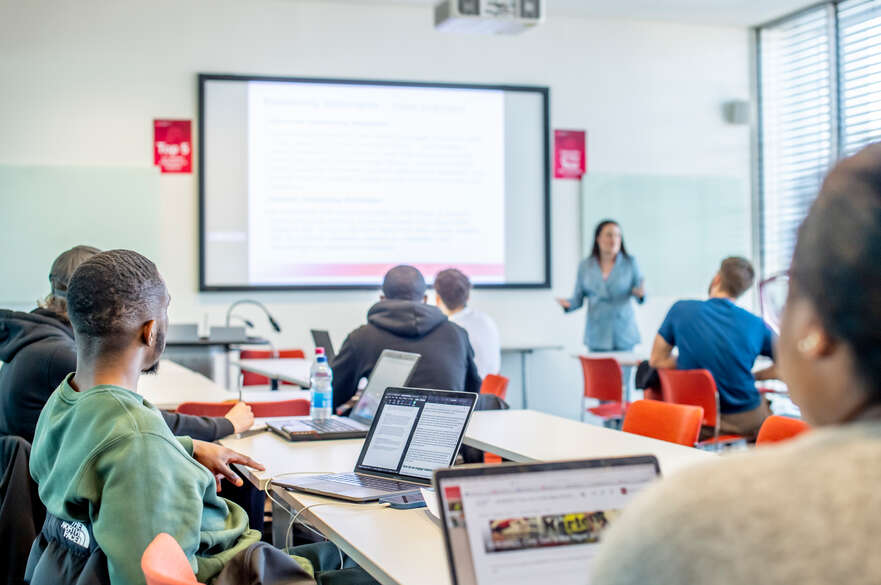Beat the Clearing queue
About this course
- 22nd in the UK for Business and Management (The Guardian University Guide 2025)
- Top 20 in the UK for Business, Management and Marketing Teaching Quality (The Times and Sunday Times Good University Guide 2025)
- Top 20 in the UK for Business, Management and Marketing Student Experience (The Times and Sunday Times Good University Guide 2025)
The world is changing, and so are the ways in which businesses operate. Organisations need people who can think on their feet, adapt to new scenarios and rise to any challenge. On this business degree, you’ll get ready to face the unprecedented and prepare for jobs which don’t even exist yet.
From small-scale start-ups to global corporations, and from commercial enterprises to charities and community organisations, success in business isn’t always measured by money. Business professionals might be tasked with diversifying customers, finding ways to coexist with competition, reaching more people, delivering services more effectively, or anything else which works towards an organisation’s primary objectives — whether they’re financial, social or otherwise.
Our BA Business course is designed to cover every avenue. By taking a holistic approach, you’ll lay the foundations for a career in any sector you choose — because when it comes to business, there are no limitations.
What you’ll study
As a BA Business student, you’ll focus on applying your learning to the real world. You’ll delve into the history of business, and use this knowledge to analyse and predict current and future trends. You’ll learn business theories, and be able to identify circumstances where they’re relevant and adapt to situations which defy them. And you’ll develop technical skills and get familiar with contemporary tools to implement what you learn in real-life settings, like using AI and finding solutions to digital challenges.
Most importantly, you’ll get invaluable experience of business in action. In addition to live briefs for real clients being built into your modules, you can opt to do a year-long paid placement or a half-year
internship, and take advantage of NBS’s many networking events. The choice is yours, but it’s this CV-boosting and confidence-building experience that will set you apart after university.
Studying this business degree, you’ll:
- Develop a strategic mindset and fundamental understanding of business before shaping your degree around your aspirations and interests, with a broad range of modules and alternative study paths to choose from in Year Two and beyond.
- Get real work-like experience woven into your course, with live briefs, short-term placement and internship opportunities, and the popular option to spend a placement year in paid, full-time employment whilst being supported by us.
- Attend talks from guest speakers including alumni and industry experts, who share insights, advice and perspectives from different roles and fields.
- Consider key principles like sustainability and make decisions which align with your values throughout the course, to help you futureproof today’s businesses and make sure you’re ready for whatever lies ahead.
- Have the chance to work or study abroad in Year Two or Year Three (four-year ‘Sandwich’ option), building an international network of industry contacts. · Be able to access specialist guidance and advice on building your own business with NTU Enterprise — previous students have even spent their placement year doing this.
Here’s a breakdown of your modules on this business course:
Accounting and Finance for Managers
During this module you will develop the skills and competencies needed to make effective use of accounting information especially for control and decision making purposes. You will explore how business organisations are financed and the constraints and limitations that financing imposes on them. You will also learn about the calculation of accounting profit and its importance to an organisation. You will develop skills that will allow you to identify relevant cash inflows and outflows of a proposed business project, and learn about utilising the techniques of break-even analysis in project decision making.
The importance and use of budgeting for forward planning, communication, coordination and control within an organisation will be covered, as well as the importance of cash and liquidity within an organisation and the construction of cash and working capital budgets. You will learn how to use cash and working capital management models and techniques and how to construct financial statements. Other areas covered in this module include financial appraisal of long term capital investment proposals and valuation of company shares.
Economics and Data Analysis for Managers
Introduces key principles in economics and data analysis used to describe and understand the behaviour of consumers and producers, and, more generally, economic activity.
Foundations of Managing and Organising
Both work and management are carried out by people, the human resources of the organisation. The focus of this module is on the management of work in organisations, and will provide you with a holistic understanding from the viewpoint of both the worker and management. You will be introduced to key applications, policies and practices that are involved in the management of human resources, and will analyse their underlying theoretical basis and the effects on the organisation and society in general.
Principles of Marketing
Marketing is an essential part of any successful business. The Principles of Marketing introduces the fundamental theories and concepts that are useful for making business and marketing decisions. The importance of the customer and their place at the heart of all marketing decisions is a key theme running through the module. It will look at the changing needs of the customer with products and services that are important to them, at a price that represents value and a place that is convenient. In addition, it will consider the options for communicating with the customer. It will also prepare you for the marketing modules studied in the second year of your course.
Essentials of Business Development
This module introduces you to the dynamics of business and enterprise in the context of organisational growth, blending operations management theory with real-world challenges. You’ll explore how different types of organisations—start-ups, SMEs, large businesses, and the public sector—navigate decision-making, operational development, and strategic challenges. Emphasis is placed on the role of enterprise and entrepreneurship skills to design, deliver, and improve products and services, particularly in response to evolving customer preferences and sustainability pressures in a global landscape characterised by uncertainty and constant change.
Personal and Academic Development
Helps you recognise the personal skills, behaviours and attributes you currently have, and supports you in formulating a continuous personal and professional development plan to develop the skills and knowledge you need to achieve your future ambitions and realise your full potential.
First half of Year Two – Core modules
Managing and Organising for Human Resources
This module aims to develop an understanding of the human aspects of managing and organising work. It draws upon ideas from disciplines such as work psychology, organisational sociology and human resource management to provide insights into possibilities for managing and organising work. The module considers the nature of the changing context of managing and organising and examines the central issues and contemporary concerns that this presents for HR.
Throughout the module you will be encouraged to develop a critical perspective which encompasses views from both those managing and those managed, as well as a consideration of the wider impact of choices taken in regards to managing and organising work activities. Whilst exploring classic studies in managing and organising, these ideas will also be examined in the context of the contemporary changing international workplace. The module is relevant to a broad range of careers given that HR issues are a concern for all.
Survey Research and Analysis for Business
This module draws on conceptual material in the area of Survey Methods widely used in business and the application of analytic methods to the data generated. One of the primary focuses of this module is to help you understand how to plan and conduct surveys but also interpret the results within the appropriate business context. With the aid of appropriate professional statistical software you will be encouraged to apply statistical methods of analysis to data. The module is designed to allow you the opportunity to analyse and interpret “real data” from various areas of the business world. In studying this module you will develop your knowledge and skills in conducting survey research within business.
You will be given the opportunity to plan and execute a survey; design and implement a survey instrument; analyse survey results using applications software; and interpret and communicate analytical findings.
Digital Entrepreneurship
The aim of this module is to develop your critical awareness of digital entrepreneurship and intrapreneurship within a global marketplace. During the module you will examine the process of developing a digital business that is enabled and / or enhanced by internet technologies, smart and mobile phones and their applications, and other emerging technologies.
Second half of Year Two
You can either select one of our unique opportunities initiatives below or continue with your taught modules.
Option 1 – Study Abroad
Experience life in another country by studying at one of our partner universities. Choose from a host of countries in Europe or go further afield and study in the USA, South America, Australasia and South East Asia. This is a great opportunity to develop your independence and explore another culture.
Option 2 – Enterprise Project
Explore your entrepreneurial side and start to develop the meaningful and practical skills needed to run your own business. Supported by NTU Enterprise, NTU's centre for Entrepreneurship and Enterprise, during this opportunity you'll work alongside other young entrepreneurs and a dynamic network of mentors and advisors, to develop your own ideas into a live enterprise project.
Option 3 – Internship
Get a taste of the working world and gain some essential industry insight with a 16-18 week work placement. The experience will allow you to put your learning in to practice, with the experience gained improving your future career prospects, and sharpening your interpersonal and professional skills.
Option 4 – Continue with taught modules
If you didn't fancy doing any of the above options then you can continue your studies at university. With a mixture of both compulsory and optional modules, the first will enhance your knowledge and skills set in your area of study, with the later allowing you to tailor your learning experience.
Students on Sandwich courses are eligible to choose the Enterprise project or continue with taught modules in the second half of their second year. They are not eligible for options 1 and 3. However, they are able to use their sandwich year to study or work abroad.
Core modules
Applied Professional Development
Following on from the Personal Development module in Year One, this module supports you to build upon and reflect on your personal and professional skills, attributes and behaviours. You will attend a conference with a varied programme of events focused on the future of work, and later in the module you will immerse yourself in a period work or work-like experience to develop a range of skills designed to enhance your employability.
Marketing Management
This module explores the role of marketing management and its interaction with other business functions. You will study marketing management concepts that support the development of sound marketing strategies, and also have the opportunity to develop effective group and personal skills that are valued highly by employers.
Plus one optional module from:
Management Accounting for Decision Making
The manager and entrepreneur of the future must have sound financial skills to enable them to take advantage of their environment. Critical to this process is understanding the environment in which you operate and the financial structure of your organisation. You need to understand the information that is required to successfully manage your organisation and how to interpret it. During this module you will examine a range of management accounting techniques that are used in business decision making, and explore how accounting and finance information could evolve to meet the needs of organisations operating in competitive markets.
You will study the value and limitations of accounting information for managerial decision making, planning and control purposes within organisations, and develop your understanding of problem solving techniques that are frequently used by teams operating in an organisational context, and how these techniques could be used within the accounting and finance framework.
Exploring Strategy and Innovation
This module provides an understanding of business development and strategy with particular reference to processes of strategic management, innovation and business development in the global context. It will develop your understanding of competitive advantage and introduce you to key concepts in strategy, organisational change and development, all drawn from different cultural contexts. You will examine the nature of innovation, and the process involved in bringing it about. This module also seeks to demonstrate how innovation can provide competitive advantage for business firms operating in local, national and international environments.
Over the course of the module you will: ·
- study profitability and the nature and purpose of corporate and competitive strategy in a global context
- explore corporate direction, goals, mission and vision
- analyse the business environment, methods and techniques of analysis and its relevance to competitor and customer development
- explore the nature of technological change and its links to innovation
- classify innovation and innovative activity
- analyse the process of innovation and different perspectives on the process.
Managing the Global Supply Chain
Focusing on operations and marketing, this module your practical understanding of the structure and organisation of supply chains, including sustainability and ethical issues. The areas you will cover include operations, logistics and procurement, and the importance of the flow of goods and information in providing value through global delivery systems.
Optional placement year
In year three, you have the option to take a placement year. This time spent working in business provides our students with crucial work experience, which is highly prized and much sought after by employers upon graduation. We have links with a wide range of sectors, firms and organisations that offer student placements. If you have decided to undertake a placement year then this will last for a minimum of 48 weeks during your third year.
Our Employability Team is here to inspire and enhance every stage of your career planning and as a graduate of NTU, you will be able to access their services for three years after your course has finished.
Services they provide include:
- finding placements, internships and part-time work
- pursuing self-employment
- taking gap years and time out
- getting into volunteering
- providing advice on further study.
Or
Taught modules
If you have decided to continue with your studies please view the 'final year' tab for your list of modules.
Developing Professional Impact
This module is designed to expand your horizons and challenge your attitudes and behaviours both in relation to subject specific issues and wider business concerns such as global citizenship and sustainable business practices. It will encourage you to build on your strengths and explore a range of possibilities as you embark on your next steps.
Comparative and International Management
Influences of culture on management, and managing within and across diverse cultures, have become increasingly relevant in today’s business world. This module aims to address the issues of cultural differences, and practical implications of the internationalisation of management, the organisation and its people.
Personal experiences of national and organisational cultures – either through work in multinational corporations or travel far and wide – provide a rich pool of experiences, stories and ordeals that can serve as important inputs into discussions and debates about management, organisations, people and cultural diversity.
This module adds to this experience through theoretical and conceptual knowledge and frameworks concerning different management styles and philosophies from an International Human Resource Management perspective. It uses practical experience and current topical research and case studies to explore key debates and issues central to the international organisations. During this module you will examine and explore problems that arise from these matters and the solutions that are needed.
Leveraging Information and Knowledge for Digital Transformation
In this module, you'll explore how organisations use data, information and knowledge to shape their strategy. You'll examine the role of technology in business decision-making, the importance of data literacy, and how organisations adapt to evolving challenges. Using real-world examples, you'll learn to distinguish between data, information, and knowledge, and understand their impact on shaping management practices and strategic opportunities. This module will equip you with the skills to navigate the complexities of digital transformation and make informed decisions in a data-driven environment.
Strategic Marketing
The overall aim of the module is to help you develop an understanding of strategic marketing and to apply this knowledge to contemporary and complex business contexts. You will examine the key concepts, frameworks and models that are involved in the strategic marketing process, as well as the challenges encountered in the implementation and control stages. You will also explore how marketing managers can best respond to a complex, dynamic and increasingly global marketing environment.
The module will provide you with the knowledge and skills required to conduct a comprehensive marketing audit, and will enable you to use the findings from a marketing audit to inform your choice of marketing objectives and alternative strategic choices.
Plus one optional module from:
Applied Business Research Project
For this module you will undertake a purposeful, individual, in depth study of a relevant topic, developing your independent learning, critical thinking and knowledge of research techniques relevant to your subject area. The project will develop your ability to manage a major piece of work, for which you will be completely responsible, and will be completed over a period of several months. You will learn to utilise and improve your time management and communication skills, as well as test your initiative and resourcefulness.
To support your development during this module you will study essential skills such as critical thinking, conducting a literature review, understanding the appropriate research framework, practical research methods and skills, report and academic writing skills.
Sustainability Impact Project
Sustainability is one of the most pressing challenges facing modern organisations, influencing every aspect of business strategy and leadership. This module equips you with the critical skills and knowledge to navigate the complex social, economic, environmental, and managerial dimensions of sustainability. You'll explore how businesses are adapting to global challenges, balancing profit with purpose, and driving long-term success through responsible decision-making. By applying theory to real-world scenarios, you'll develop the problem-solving and analytical abilities needed to shape sustainable strategies, preparing you to be a future leader in an ever-evolving business landscape.
Plus one optional module from:
Managing Creativity, Design and Innovation
In a highly competitive and globalised market place with increasing expectations and demands of consumers, an organisation’s ability to develop successful products, services and processes is critical. The importance to business of understanding, supporting and managing creativity and innovation cannot be underestimated.
This module will develop your understanding of the relationships between creativity, design and innovation, and explore and debate a range of perspectives concerning their nature. You will contemplate some of the issues facing organisations trying to harness the potential from their creative resources, and be encouraged to develop your own creative skills. You will develop a critical awareness of theories related to the origins and role of creativity at individual, team and organisational levels.
Over the course of the module, you will study a range of topics including: approaches to creativity theory, creativity and innovation as complex processes, design and development in a product and service context, building and sustaining a culture focused on creativity and innovation.
Global Supply Chain Strategy
Working at a strategic level, this module will clarify how marketing, design, distribution, logistics and project management may be integrated, and help you to develop a broader and deeper understanding of how supply chain performance can be strategically improved.
You will cover a number of areas during the module including;
- looking at supply chains from a strategic and global perspective
- key concepts in supply chain improvement
- interpreting lean and agile supply
- supply chain dynamics – Forecasting, information flow and bullwhip
- design for the supply chain – postponement, mass customisation, product life cycle, sustainability
- managing CSR in the supply chain – sustainability, environment and transport
- managing risk in a supply chain.
Corporate Governance and Risk Management
By studying current recommendations and developments in the field of corporate governance both in the UK and in a selection of overseas countries, this module will show you the importance of control and risk management when implementing strong governance measures, and evaluate the ethical and moral dilemmas faced by those entrusted with these responsibilities.
We regularly review and update our course content based on student and employer feedback, ensuring that all of our courses remain current and relevant. This may result in changes to module content or module availability in future years.
Don’t just take our word for it, hear from our students themselves
Video Gallery
How you're taught
NTU is TEF ‘Gold’-rated for teaching and learning, and our teaching team boasts professionals from all over the world, with experience in countless industry sectors and covering all areas of business.
On this business degree, our doors are always open. We care about you and your future, and we’ll not only support you in your studies, but also hold you accountable for making the most of everything NBS has to offer. This one-to-one support isn’t typical in big business schools, but we’re proud to provide it. Alongside your tutors, the wider NBS community will form a solid support network — and many of those same connections will become your professional network, too.
As well as lectures, seminars and presentations, you’ll learn by:
- Experiencing business beyond the classroom. Work on live projects for real organisations, learn from expert guest lecturers and alumni, and build your professional network by getting involved with NBS’s jam-packed calendar of events, including career fairs, placement fairs, business talks and more.
- Completing placements, internships and enterprise projects. From opting to do a paid, year-long placement in Year Three (which our Employability and Accommodation teams will help make possible) to the short-term internship opportunities offered throughout this business course, you’ll get hands-on work experience and build meaningful relationships with employers. You’ll also have the chance to launch or develop your own business or enterprise project if you want to, guided by professionals who’ve done it themselves.
- Making your own choices. As the course develops, so will your options. If you dream of studying abroad, take an extended stay with one of NBS’s global partners or even complete a placement overseas. Prefer to stay local? If the internship or enterprise project pathways don’t appeal, you can simply continue with your taught modules. It’s a versatile offer, built around your own preferences.
How you're assessed
Assessments on this business degree are focused on variety and authenticity, meaning they’re designed to help you showcase your skills and reflect the ways you’ll be working in industry. This could involve reports, group presentations, essays, timed assessments, in-class activities and poster presentations. Your assessment types will vary depending on which modules you choose.
Pitching and presenting your work is a key part of BA Business, but don’t worry — you’ll get plenty of practice, and by the time you reach final year, you’ll have built up enough confidence to breeze through it.
Careers and employability
BA Business at NBS is about preparing for your future. By the time you graduate, you’ll be resilient and adaptable, have the flexibility to pivot and specialise, and be able to use critical thinking to understand people and organisations. You’ll be a well-rounded businessperson, presenting yourself with confidence and professionalism.
Our alumni work in management, finance, HR, governance, economics, sales, marketing and more. They’re not only working in private and public sectors, but also owning and running their own businesses. With the technical knowledge and transferable skills you’ll perfect on this business degree, your career options won’t be limited by role, industry or location.
Personalisation at NBS — what it means for you
NBS is a community of over 8,500 learners, drawn from countries, cultures and academic backgrounds all around the world. We’re big in every sense — from our industry reputation, to our global community of ambitious students and successful graduates, to the sheer range of opportunities we provide. Study with NBS, and you’ll benefit from our partnerships with universities and businesses on every continent.
We’re proud to provide our students with a very personal experience, built around their own specific needs, interests, and ambitions. It’ll be the same for you: whether choosing your own specialist modules or picking your preferred means of hands-on, experiential learning, we’re here to help you gather the skills, knowledge and experience to gain that vital competitive edge. Your future and employability comes first, and everything you’ll experience at NBS has a purpose — from industry networking events and prestigious guest speakers, to the personal and professional development modules that’ll support each step of your university journey. Book onto an NTU open day to find out more.
Campus and facilities
You’ll mainly be studying in the Newton building, NBS’s home at the centre of our vibrant City Campus. Here, you’ll learn in bright, modern classrooms and lecture theatres, access dedicated IT suites, and work on your assignments in comfortable study spaces. Our Employability Hub is conveniently located in the same building as your lectures, offering comprehensive career advice and help finding placements.
NTU’s City Campus has everything you’ll need to keep occupied between lectures. As well as the Boots Library with its beautiful roof garden, there’s a 100-station gym; convenient cafés, bars and restaurants to suit every taste; our Students’ Union and popular Global Lounge; and much, much more!
If that’s not enough, just take a few steps off campus, and you’ll find yourself in the beating heart of Nottingham — one of the UK’s top 10 student cities, and one of the top 25 in all of Europe. It’s a city brimming with history, culture and things to do: enjoy lush green spaces, galleries, cinemas and vintage shopping by day, and an acclaimed food, drink and social scene by night.
Take a Virtual Tour to see for yourself where you’ll be studying.
Entry requirements
UK students
Standard offer: 112 UCAS Tariff points from up to four qualifications.
Contextual offer: 104 UCAS Tariff points from up to four qualifications.
To find out what qualifications have tariff points, please use our tariff calculator.
Additional requirements for UK students
There are no additional requirements for this course.
Contextual offers
If you don’t quite meet our entry requirements, we might be able to make you a lower offer based on a range of factors, including your background (such as where you live and the school or college you attended), your experiences and your individual circumstances (you may have been in care, for example). This is called a contextual offer, and we get data from UCAS to help make these decisions. We do this because we believe everyone with the potential to succeed at NTU should have the opportunity to do so, no matter what barriers you may face.
Meeting our entry requirements
Hundreds of qualifications in the UK have UCAS Tariff points attached to specific grades, including A-levels, BTECs, T Levels and many more. You can use your grades and points from up to four different qualifications to meet our criteria. Enter your predicted or achieved grades into our Tariff calculator to find out how many points your qualifications are worth.
Other qualifications and experience
NTU welcomes applications from students with non-standard qualifications and learning backgrounds, either for year one entry or for advanced standing beyond the start of a course into year 2 or beyond.
We consider study and/or credit achieved from a similar course at another institution (otherwise known as credit transfer), vocational and professional qualifications, and broader work or life experience.
Our Recognition of Prior Learning and Credit Transfer Policy outlines the process and options available for this route. If you wish to apply via Recognition of Prior Learning, please contact the central Admissions and Enquiries Team who will be able to support you through the process.
Getting in touch
If you need more help or information, get in touch through our enquiry form.
International students
Academic entry requirements: 112 UCAS Tariff points from up to four qualifications. We accept equivalent qualifications from all over the world. Please check your international entry requirements by country.
English language requirements: See our English language requirements page for requirements for your subject and information on alternative tests and Pre-sessional English.
Additional requirements for international students
If you need help achieving the academic entry requirements, we offer a Foundation preparation course for this degree. The course is offered through our partner Nottingham Trent International College (NTIC) based on our City Campus.
English language requirements
View our English language requirements for all courses, including alternative English language tests and country qualifications accepted by the University.
If you need help achieving the language requirements, we offer a Pre-Sessional English for Academic Purposes course on our City campus which is an intensive preparation course for academic study at NTU.
Other qualifications and experience
If you have the right level of qualifications, you may be able to start your Bachelors degree at NTU in year 2 or year 3. This is called ‘advanced standing’ entry and is decided on a case-by case basis after our assessment of your qualifications and experience.
You can view our Recognition of Prior Learning and Credit Transfer Policy which outlines the process and options available, such as recognising experiential learning and credit transfer.
Sign up for emails
Sign up to receive regular emails from the International Office. You'll hear about our news, scholarships and any upcoming events in your country with our expert regional teams.
Getting in touch
If you need advice about studying at NTU as an international student or how to apply, our international webpages are a great place to start. If you have any questions about your study options, your international qualifications, experience, grades or other results, please get in touch through our enquiry form. Our international teams are highly experienced in answering queries from students all over the world.
Policies
We strive to make our admissions procedures as fair and clear as possible. To find out more about how we make offers, visit our admissions policies page.













